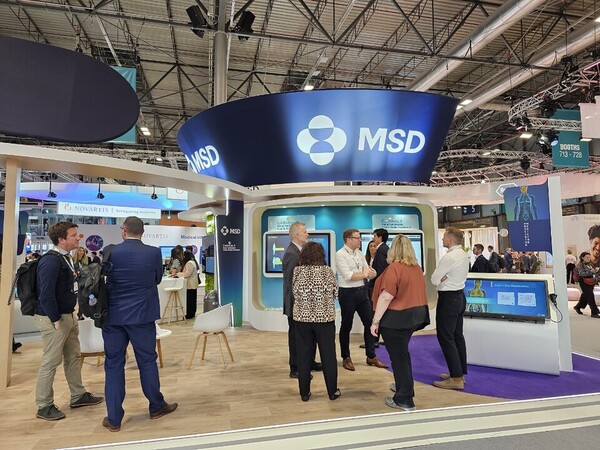Ahead of the patent expiration of anti-PD-1 inhibitor Keytruda (pembrolizumab), MSD (Merck & Co in the U.S.) is looking to secure new growth engines by developing Keytruda combination therapy and antibody-drug conjugate (ADC) pipeline.
Yujin Investment & Securities analyzed MSD's stock price and pipeline development in a report on Tuesday.
In the report, analyst Kwon Hae-soon pointed out that MSD's stock price 2023 rose by only 1 percent compared to the previous year. This is significantly lower than the 50 percent year-on-year increase in 2020.

Kwon believes the stock price reflects the market's concern that MSD's flagship products, Keytruda and Gardasil, will not sustain growth when their patents expire in 2028.
The projected sales of Keytruda and Gardasil in 2023 were $25 billion (33 trillion won) and $9.7 billion, representing 40 percent and 14 percent of MSD's total revenue, respectively.
MSD is strengthening its position in the oncology market by securing Keytruda's combination therapies and ADC pipelines.
In the ESMO 2023, MSD unveiled clinical results of the combination of Keytruda and ADC Padcev (enfortumab vedotin) of Astellas and won approval as a standard of care for the first-line treatment of urothelial carcinoma following promising clinical trial results.
In addition, MSD announced an ADC co-development strategy with Japan's Daiichi Sankyo last Octoberr and introduced three new drug pipelines for $22 billion. The most advanced of these, MK-1022 (HER3-ADC), applied for priority review to the U.S. Food and Drug Administration at the end of last year and is expected to win approval around June.
At the Goldman Sachs C-Suites Conference on Jan. 4, MSD also announced its mid- to long-term growth strategy, which includes plans to expand the Keytruda combination therapy and ADC pipeline, advance new metabolic disease pipelines into late-stage clinical development and launch new products. MSD said profitability will improve as royalty payments for Keytruda and Gardasil decline this year.
Korean companies are also closely involved in the clinical development of MSD's new pipeline. First, a Keytruda SC formulation with Alteogen’s technology is expected to be launched in 2025. In the metabolic disease therapeutics segment, the company will see the results of the phase 2b trial of the GLP-1/GCG dual agonist MK-6024 (efinopegdutide) in 2025.
MK-6024 is a non-alcoholic steatohepatitis (NASH) treatment candidate (HM12525A) that MSD acquired from Hanmi Pharmaceutical in 2020.
Besides, MSD's pulmonary arterial hypertension drug sotatercept is expected to win approval from the U.S. FDA in the first quarter of this year. Analyst Kwon expects mid- to long-term sales of sotatercept to exceed $10 billion.
On Monday, MSD announced at the ongoing J.P. Morgan Healthcare Conference in San Francisco that it is acquiring Harpoon Therapeutics for $680 million. MSD gained a new pipeline through this acquisition, including DLL3-targeting T-Cell Engager HPN328. It is a candidate for treating small cell lung cancer (SCLC), and the company expects to see phase 1 data in the first half of this year.

